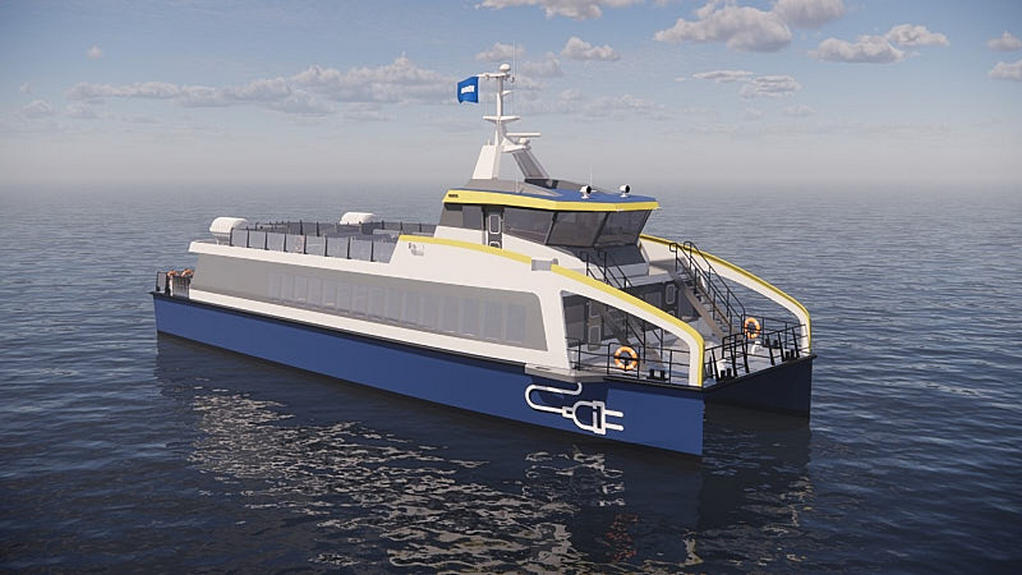The recently launched Octopus Series battery system will be installed onboard the new Damen Electric Fast Ferry for AG Reederei Norden-Frisia. The German Ferry operator is taking steps towards achieving its vision of a green future by partnering with Damen Shipyards, one of the world’s leading shipbuilders, for the design and construction. The fully electric vessel will transport passengers fast, clean and comfortable thanks to EST-Floattech’s battery system.
The ferry will operate between Norddeich and the island of Norderney, which required Damen to develop a completely new vessel: the Damen Electric Fast Ferry (EFF) 3209 – known as the E-Cat Ferry. A standard vessel was impossible due to the shallow waters in which the ferry must operate. Secondly, the ferry will sail seven times a day, for which the vessel’s draft is limited to a maximum of 1.2 meters. A challenge for which Damen found a solution.
The fleet of Reederei Norden-Frisia will be extended with this 32-meter-long, fully electric catamaran. The E-Cat Ferry can carry up to 150 passengers. With the EST-Floattech High Energy Octopus Series battery system, the ferry can reach speeds of up to 16 knots and can charge within half an hour.
EST-Floattech sized the battery system after calculating performance and lifetime data, based on the specified load profile of this vessel. The electrical installation of the vessel will be provided by system integrator Royal van der Leun, with whom EST-Floattech has had previous successful collaborations. The battery system is Lloyd’s Register type approved and the new ferry will sail under Lloyd’s Register classification.
Jelle Meindertsma, Sales Manager at EST-Floattech: “It is satisfying to be part of a challenging and innovative project that contributes to a cleaner environment. In this case, an electric ferry that will be sailing in the Wadden Sea, which is a UNESCO World Heritage Site, comes with strict design criteria. Our team worked diligently to ensure that the Octopus Series High Energy Battery System met the requirements. The battery system will ensure that the ferry can sail at the needed speed and charge during stops without CO2 emissions, providing a sustainable and eco-friendly transport solution.”
“We have already increased sustainability on land and two years ago we decided it was time to take a look at our fleet,” says Michael Garrelts, Norden-Frisia Marine Superintendent. “For our fleet, we believe it is elementary that the battery system corresponds to the latest technology and safety standards, and that we can create a balanced power-to-weight ratio.”
Damen Shipyards expressed its delight in partnering with EST-Floattech on this state of the art fully electric ferry: “We are very excited about this project, which is a significant step towards Damen’s goal of reducing the environmental footprint of our vessels while maintaining optimal performance with EST-Floattech’s Lithium-Ion cells.”
Once the hull has been constructed at Damen’s yard in Kozle, it will be transported to Damen Shipyards Gorinchem for outfitting. The vessel is scheduled for delivery to Norden-Frisia in May 2024. We can expect the demand for this type of vessel to grow as more passengers are consciously looking to contribute to the energy transition.
Source: EST-Floattech.
Tags: E-Cat, Ferry Operator, Octopus High Energy


Recent Posts
Govt urges sugar industry to diversify into green fuels
Cement sector must innovate to achieve net-zero emissions
India’s ethanol production capacity reaches 1,685 crore liters
Sembcorp bags first solar plus energy storage project in India
Wärtsilä to power world’s largest cement carrier for NovaAlgoma
Ethanol sourcing from sugar mills to be less this season
Centre grants approval for 47 ethanol projects in Bihar
China builds seawater hydrogen production project